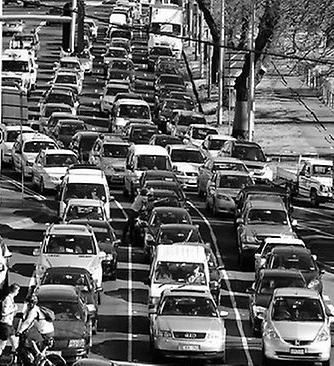Melbourne votes to cut cars
 Melbourne City Council has voted on new measures to halve the number of cars driving through Melbourne’s CBD.
Melbourne City Council has voted on new measures to halve the number of cars driving through Melbourne’s CBD.
The council has unanimously backed a new transport strategy that would see a 40km/h speed zone expanded across inner-city suburbs, footpaths widened and de-cluttered, and the periodic closure of Melbourne's ‘Little’ streets (Little Collins, Little Bourke, Little Lonsdale, Little La Trobe) to cars to give pedestrians priority.
Transport portfolio chair Nicolas Frances-Gilley says that with 500,000 new people are expected to use the inner city each day by 2036, space is needed for walking, cycling and public transport.
The plan attempts to contend with changing lifestyles. For example, nearly 90 per cent of all trips made in the CBD are on foot, but just 26 per cent of street space is allocated to footpaths.
Council now plans to de-clutter the footpaths by shifting motorcycle and bicycle parking to the road.
“We need to remove some of the things on the pavement, but not in a heavy-handed way,” Cr Frances-Gilley said.
Currently, half of those coming into the city do so by car, but the new plan seeks to reduce this to 20 per cent by 2030.
The strategy should also create up to 90 kilometres of new bike lanes.
“Ten per cent of people from the north of the city come in on bikes. Up to 30 per cent would if there were segregated bike paths ... so those people are not on the tram or in the car,” Cr Frances-Gilley said.
Major policies such as speed limit changes and congestion charges would have to be approved by the state government.
However, policies to remove car parking and upgrade footpaths can go ahead.
The strategy also includes a push for a congestion charge – where drivers would pay to cross a boundary into the CBD in the morning peak and out in the afternoon peak.
A new report by the Grattan Institute shows this would reduce congestion by about as much as Melbourne’s $17 billion North East Link would.
A Deloitte Access Economics report commissioned by the council says its congestion-busting measures would deliver an $870 million boost to Victoria's economy.








 Print
Print